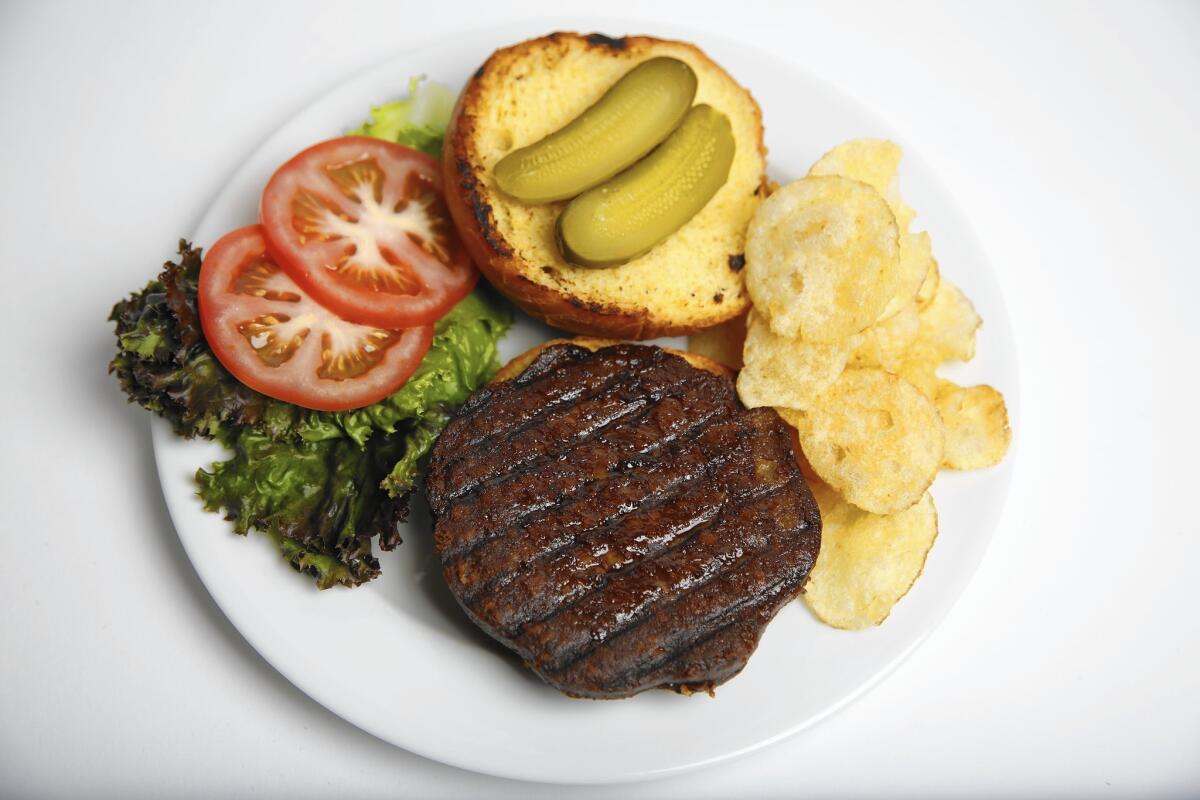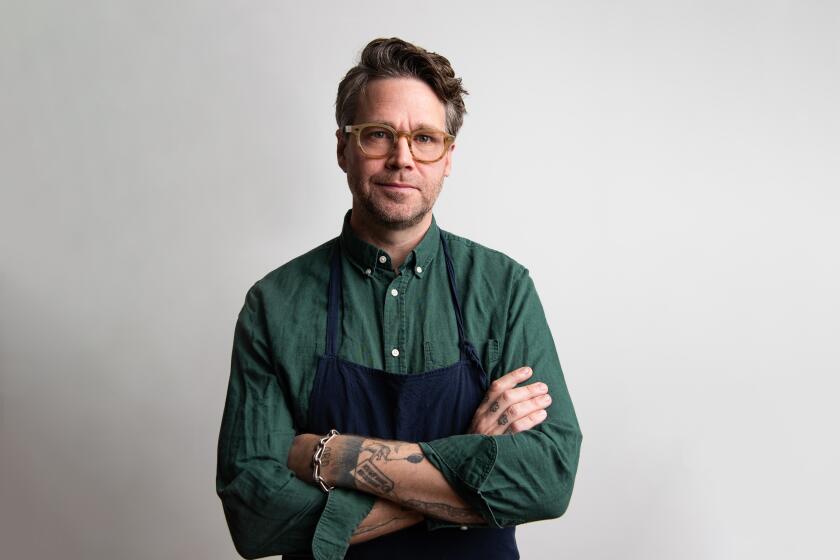For vegetarians and vegans, it’s a new world of appealing options

In his new book, environmental journalist Joel K. Bourne Jr. argues that poverty is only partly to blame for hunger. Prosperity also plays a role: When people have more money, they tend to eat more meat and dairy foods. And that, he says, will increase the severity of the problem.
“More than two-thirds of the world’s agricultural land is already used to grow feed for livestock, [and] world meat consumption is on track to double by 2020,” Bourne says in “The End of Plenty: The Race to Feed a Crowded World.” But the United Nations Food and Agriculture Organization predicts grain production will need to grow by at least 70% by 2050 to keep up with population growth, he writes.
Even California Gov. Jerry Brown has weighed in on the use of resources, saying during a recent conversation about the drought: “If you asked me, I think you should be eating veggie burgers.”
So what does that mean for responsible consumers who want to embrace a vegetarian or vegan diet but who also want to eat well?
Never have they had so much choice.
“It’s a real renaissance,” says Bob Goldberg. As a young idealist, Goldberg and three long-haired friends opened Follow Your Heart cafe in 1970 in Canoga Park when they had, he says, the right ideas but not the array of products they sell now.
“For a vegetarian or a vegan ... there are almost limitless possibilities” today, he says.
One of those possibilities is being imagined in a low-slung brick building in El Segundo at a company called Beyond Meat, where dozens of innovators work at computer stations to “figure out the building blocks of meat from the plant kingdom,” says Ethan Brown, the company founder. Aside from burgers, Beyond Meat makes “chicken” strips and tenders, and crumbles for tacos and meatballs.
In Northern California’s Marin County, Miyoko Schinner is making cultured nut products — vegan cheese to those of us not beholden to legal names — that she says can pass for dairy-based cheeses. And Kite Hill, a company in Hayward, Calif., is manufacturing “cream cheese-style spreads” made from almond milk, among other ingredients.
“As an intelligent, evolved society, I think it’s inevitable that we will move toward a plant-based lifestyle,” says Matthew Kenney, a well-known chef who recently opened the vegan restaurant Plant Food and Wine on Abbot Kinney Boulevard in Venice. “Food should be nurturing and life-giving and health-giving,” he says as he sits in the elegant garden at the restaurant.
Not many years ago, a vegan restaurant on his high-rent street would have been preposterous. “The landlord would have laughed at our concept,” Kenney says.
And while fast food is generally still meat-centric, Kenney cites the proliferation of juice bars as a sign of change: “Have a green juice and most people are not going to think, ‘Oh, I want a cheeseburger after that.”
Statistics — less than 5% of people in the U.S. are vegetarians and less than 1% are vegans — have not moved much. But vegetarian and vegan dishes show up on the “hot trends” tracked by the National Restaurant Assn., and the choices in supermarkets have grown substantially. Just about every college cafeteria has food catering to those who don’t eat meat.
The shelf space devoted to vegan products, excluding produce, has at least doubled in the last decade at his stores, says Tim Fanning, grocery coordinator of the Southern Pacific region of Whole Foods, which includes Southern California. Companies are coming up with “excellent flavors and options. It’s hard to pass them up.” Burgers are a major place for that innovation, Fanning said, with nut milks, vegan cheeses and other main-course foods also expanding.
Says Brown: “For me it’s a mission as much as anything. I want to make the world a better place for my kids.” In his office at Beyond Meat, there’s a board that lists company goals: health, using fewer of the planet’s resources, helping to fight climate change and preserving animal welfare. “I don’t want to preach, but it seems like something has to be done.”
But taste, of course, is key.
“If it tastes good, people will buy it,” says Cathy Strange, the global cheese buyer for Whole Foods, who said she has put Kite Hill’s products on cheese trays with animal cheeses and that people didn’t notice a difference.
Schinner, who says she was once a dairy-based cheese “addict,” agrees. Vegan potlucks, once a sea of brown, have become a rainbow, Schinner says. Ethnic dishes, “amazing combinations of salads,” raw foods — not just vegan versions of meat dishes — are on the table, she adds.
Her company, Miyoko’s Kitchen, produces vegan cheeses wrapped in fig leaf or covered in ash, among other varieties. They’re organic and fermented with live cultures.
It’s an idea whose time has come,” says Goldberg, whose company makes Vegenaise and other products. “The whole idea that our food is what’s making us sick is becoming more difficult to avoid.”
Beyond Meat gears up for an ad blitz on its Beast Burger
Beyond Meat’s Beast Burger was introduced earlier this year and received good reviews from many people seeking a vegan burger that tastes like beef. One of them, a writer for Outside magazine, said it prompted him to give up meat altogether.
The burger boasts more protein than beef and no GMOs, soy or gluten. It’s marketed as a “quarter-pound monster of untamed plant protein and essential nutrients,” and its long list of ingredients includes pea protein isolate, a blend of oils, methylcellulose, yeast extract, potassium bicarbonate, tapioca starch and sea buckthorn juice powder. What’s more, it’s now the company’s top seller and is sold in 9,000 grocery stores nationwide, according to Beyond Meat founder Ethan Brown.
For Brown, there’s still work to do to make meat from plants — and to get the average consumer on board with plant-based meat. To that end, he says, Beyond Meat is starting a campaign in September called the Future of Protein, featuring such athletes as New York Mets third baseman David Wright, L.A. Clippers shooting guard J.J. Redick and Minnesota Lynx forward Maya Moore.
Vegan Scene offers cooking classes, yoga and clothing in Venice
When Amy Rebecca was naming her new business, her dad suggested she keep the word “vegan” out of it. But she wanted her mission stance front and center. Vegan Scene, a boutique and space for cooking and fitness classes, opened July 31 on Main Street in Venice.
“I love fashion, I love going out, fun, chic glamour,” Rebecca, who has been vegan for nearly half her life, said one Sunday before a yoga class. What she saw on the market was a little too granola for her.
“I wanted to find a way to bring a different look and vibe and bring the things I love into one space,” she added.
That includes cooking classes by Spork Foods, classes in yoga and Pilates and other events, and shelves of clothing. A pretty white “leather” miniskirt is $270, but offerings include less expensive jewelry, toiletries, fashionable athletic clothing, and other items from companies such as Kai, Matt+Natt and the Vegan Collection.
ALSO:
One way to a long and healthy life? Live a ‘Blue Zone’ lifestyle
Why Loma Linda residents live longer than the rest of us: They treat the body like a temple
Eight ways to create your personal ‘Blue Zone’
More to Read
Eat your way across L.A.
Get our weekly Tasting Notes newsletter for reviews, news and more.
You may occasionally receive promotional content from the Los Angeles Times.








